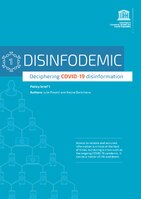
Photo from wikipedia
BACKGROUND Health misinformation on social media is a public health concern, and healthcare professionals can help correct it. However, research on how they correct health misinformation on social media is… Click to show full abstract
BACKGROUND Health misinformation on social media is a public health concern, and healthcare professionals can help correct it. However, research on how they correct health misinformation on social media is rare. OBJECTIVE To develop a conceptual model that demonstrates how healthcare professionals correct health misinformation on social media. METHODS In-depth semi-structured interviews were conducted between January and March 2020 with 30 U.S. healthcare professionals (15 registered nurses and 15 medical doctors). Participants were recruited through purposive and snowball sampling and interviewed via mobile phone calls (using their mobile phone number) or apps (via Zoom or Skype). Interview data were analyzed using a grounded theory approach. RESULTS This study presents a two-phased conceptual model that shows healthcare professionals' acts of correcting health misinformation on social media (e.g., Twitter and Facebook). The first phase involves acts of authentication by which healthcare professionals verify health-related social media posts to be true or not. They undergo the process of internal acts of authentication (i.e., checking the author, checking for cues, checking the topic) and, if needed, external acts of authentication (i.e., examining the author and examining the content). When social media posts are deemed to contain health misinformation, they proceed to the second phase - acts of correction. In this phase, they undergo correction preparation (i.e., reflect, reveal, relate, and respect) and correction dissemination (i.e., private priming, public priming, public rebuttal, and private rebuttal). CONCLUSIONS The study proposed a conceptual model that shows how healthcare professionals correct health misinformation on social media. The findings can guide healthcare professionals when identifying and correcting health misinformation on and off social media, and can guide health authorities when developing campaigns against health misinformation.
Journal Title: International journal of medical informatics
Year Published: 2021
Link to full text (if available)
Share on Social Media: Sign Up to like & get
recommendations!